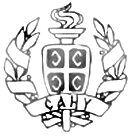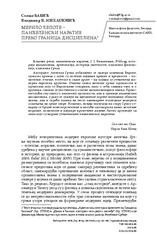Приказ основних података о документу
Мерило лепоте – панхеленски наратив преко границе дисциплина
| dc.creator | Бабић, Сташа | |
| dc.creator | Михајловић, Владимир В. | |
| dc.date.accessioned | 2021-04-26T08:00:11Z | |
| dc.date.available | 2021-04-26T08:00:11Z | |
| dc.date.issued | 2016 | |
| dc.identifier.uri | https://dais.sanu.ac.rs/123456789/10921 | |
| dc.description.abstract | Античка Грчка уобичајено се сматра колевком Европе, односно врелом с којег су потекле највише врлине и вредности – политичке, етичке, естетске и сваке друге – на којима су утемељена модерна европска друштва. Оваква слика античке грчке прошлости и представа коју су Европљани створили, како о себи самима тако и о другима, снажно је укотвљена у основе дисциплинарног знања. Преиспитујући ову слику о класичној прошлости, али и границе академских дисциплина, у раду се указује на заједничке корене појединих области знања, али и скреће пажња на често занемарене последице модерног ослањања на грчке узоре. Коначно, новим погледом на стару Грчку отварају се бројне нове перспективе и могући одговори на данас актуелне моралне, политичке и најшире друштвене дилеме, битно другачије од оних које су мориле утемељиваче панхеленског наратива. | sr |
| dc.description.abstract | Ancient Greece has been postulated to be the source of ultimate role models for artistic, ethical and philosophical values of the modern European culture in the second half of the 18th century, through the writings of J. J. Winckelmann. Soon accepted among the German–speaking intellectuals, the Pan–Hellenic narrative was spread further through Wilhelm von Humboldt’s educational reform, formulated around the concept of Bildung. The Hellenic virtues, as defined by Winckelmann, were perceived as a perfect harmony of aesthetic and ethical values, to be pursued in order to achieve the goal of the Enlightenment – free cultivated citizens. Furthermore, the Greek ideal became a universal reference point, even in the fields of research far removed from the original context of the works of art evaluation. In or- der to fully understand the influences of Pan–Hellenic narrative upon the modern worldview, the paper argues that strict disciplinary demarcation should be abandoned in favor of a more problem–oriented approach. | sr |
| dc.language.iso | sr | sr |
| dc.relation | info:eu-repo/grantAgreement/MESTD/Basic Research (BR or ON)/177006/RS// | sr |
| dc.rights | openAccess | sr |
| dc.rights.uri | https://creativecommons.org/licenses/by-nc-sa/4.0/ | |
| dc.source | Књижевна историја | sr |
| dc.subject | Pan–Hellenic narrative | sr |
| dc.subject | J. J. Winckelmann | sr |
| dc.subject | Bildung | sr |
| dc.subject | history of disciplines | sr |
| dc.subject | archaeology | sr |
| dc.subject | art history | sr |
| dc.subject | classical philology | sr |
| dc.subject | classical Greece | sr |
| dc.subject | панхеленски наратив | sr |
| dc.subject | Ј. Ј. Винкелман | sr |
| dc.subject | историја дисциплина | sr |
| dc.subject | археологија | sr |
| dc.subject | историја уметности | sr |
| dc.subject | класична филологија | sr |
| dc.subject | класична Грчка | sr |
| dc.title | Мерило лепоте – панхеленски наратив преко границе дисциплина | sr |
| dc.type | article | sr |
| dc.rights.license | BY-NC-SA | sr |
| dcterms.abstract | Mihajlović, Vladimir V.; Babić, Staša; Merilo lepote – panhelenski narativ preko granice disciplina; | |
| dc.citation.spage | 167 | |
| dc.citation.epage | 180 | |
| dc.citation.volume | 48 | |
| dc.citation.issue | 160 | |
| dc.type.version | publishedVersion | sr |
| dc.identifier.fulltext | https://dais.sanu.ac.rs/bitstream/id/44402/babic_mihajlovic.pdf | |
| dc.identifier.rcub | https://hdl.handle.net/21.15107/rcub_dais_10921 |

